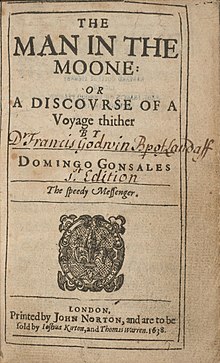 Title page of the first edition | |
| Author | Francis Godwin |
|---|---|
| Original title | The Man in the Moone or A Discourse of a Voyage Thither by Domingo Gonsales |
| Language | English |
| Genre | Science fiction |
| Published | 1638 (John Norton, London) |
The Man in the Moone is a book by the English divine and Church of England bishop Francis Godwin (1562–1633), describing a "voyage of utopian discovery".[1] Long considered to be one of his early works, it is now generally thought to have been written in the late 1620s. It was first published posthumously in 1638 under the pseudonym of Domingo Gonsales. The work is notable for its role in what was called the "new astronomy", the branch of astronomy influenced especially by Nicolaus Copernicus. Although Copernicus is the only astronomer mentioned by name, the book also draws on the theories of Johannes Kepler and William Gilbert. Godwin's astronomical theories were greatly influenced by Galileo Galilei's Sidereus Nuncius (1610), but unlike Galileo, Godwin proposes that the dark spots on the Moon are seas, one of many parallels with Kepler's Somnium sive opus posthumum de astronomia lunari of 1634.
The story is written as a first-person narrative from the perspective of Domingo Gonsales, the book's fictional author. In his opening address to the reader the equally fictional translator "E. M." promises "an essay of Fancy, where Invention is shewed with Judgment".[2]
Some critics consider The Man in the Moone, along with Kepler's Somnium, to be one of the first works of science fiction.[3] The book was well known in the 17th century, and even inspired parodies by Cyrano de Bergerac and Aphra Behn, but has been neglected in critical history. Recent studies have focused on Godwin's theories of language, the mechanics of lunar travel, and his religious position and sympathies as evidenced in the book.
- ^ Cite error: The named reference
Huttonwas invoked but never defined (see the help page). - ^ Godwin (2009), p. 67
- ^ Poole (2010), p. 57